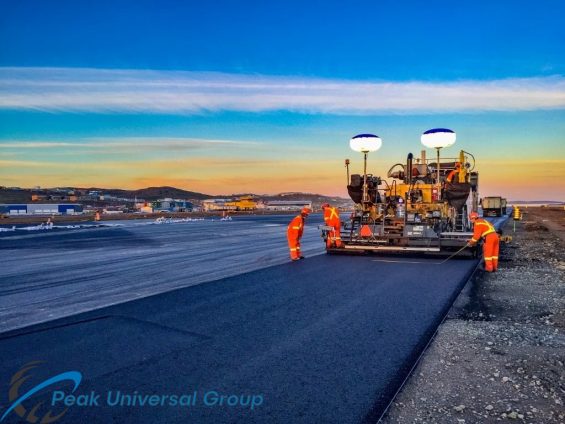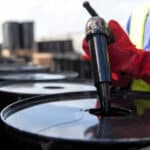
🛢️ Sustainable Environment with Polymer Modified Bitumen (PMB)
Polymer Modified Bitumen (PMB) plays a vital role in modern infrastructure while supporting the goal of a more sustainable environment. By enhancing the performance of conventional bitumen through polymer additives, PMB contributes to longer-lasting roads, reduced emissions, and more efficient resource use — all key elements in sustainable construction.
This post explores how PMB aligns with green engineering, its technical advantages, and its environmental impact across road building and industrial sectors. We will delve into the world of polymer modified, its manufacturing process, applications, benefits, and the critical role of Peak Universal as a premier supplier.
What is Polymer Modified Bitumen?
Polymer Modified Bitumen is a type of asphalt binder enhanced with polymers such as SBS (Styrene-Butadiene-Styrene), SBR (Styrene-Butadiene Rubber), or APP (Atactic Polypropylene). These additives improve the elasticity, temperature resistance, and fatigue life of the bitumen, making it ideal for demanding applications.
PMB is widely used in:
-
High-traffic highways
-
Airports and bridges
-
Urban paving solutions
-
Heavy-duty industrial surfaces
📊 Polymer Modified Bitumen Properties
Polymer Modified Bitumen (PMB) is engineered by blending conventional bitumen with polymers such as SBS (Styrene-Butadiene-Styrene) or APP (Atactic Polypropylene) to enhance its performance characteristics. The modification significantly improves elasticity, temperature susceptibility, fatigue resistance, and durability, making PMB ideal for demanding environments and heavy-duty pavements.
Here is a comprehensive table outlining the typical technical properties of PMB:
🧪 Technical Properties Table of Polymer Modified Bitumen
| Property | Typical Value (SBS Modified) | Test Method | Description |
|---|---|---|---|
| Penetration @ 25°C (0.1mm) | 50 – 80 | ASTM D5 | Indicates the softness; higher values show more flexibility at ambient temps. |
| Softening Point (R&B) °C | 60 – 75 | ASTM D36 | Reflects the temperature at which the binder softens; higher = better heat resistance. |
| Elastic Recovery (%) | > 75 | ASTM D6084 | Shows the bitumen’s ability to recover shape after deformation. |
| Ductility @ 25°C (cm) | > 40 | ASTM D113 | Measures the bitumen’s ability to stretch without breaking. |
| Viscosity @ 135°C (cP) | 1000 – 3000 | ASTM D4402 | Affects how easily the bitumen can be mixed and applied. |
| Flash Point (COC) °C | > 250 | ASTM D92 | Indicates safety under high-temperature conditions. |
| Fraass Breaking Point (°C) | < -10 | EN 12593 | Reflects resistance to cracking at low temperatures. |
| Storage Stability | Pass | EN 13399 | Confirms uniformity after extended storage. |
📘 Detailed Property Descriptions:
-
🧊 Elastic Recovery (>75%): This is one of the signature traits of SBS-modified bitumen. It ensures the material bounces back after traffic loads, preventing fatigue cracking and rutting in high-stress areas.
-
🔥 High Softening Point (60–75°C): PMB resists deformation even under high ambient or traffic-induced heat, which is crucial for tropical and desert climates.
-
🪨 Enhanced Ductility (>40 cm): Unlike standard bitumen, PMB retains flexibility at lower temperatures, significantly reducing the risk of thermal cracking in cold regions.
-
🧪 Low Fraass Breaking Point (< -10°C): This property makes PMB particularly effective for use in freeze-thaw zones, increasing road lifespan.
-
⚖️ Storage Stability: Modern PMBs are engineered for long-term stability, ensuring even polymer dispersion throughout shipping and storage periods.
-
⚙️ Balanced Viscosity: Proper viscosity ensures PMB can be applied easily while maintaining its high-performance characteristics. It also aids in uniform mixing with aggregates in asphalt production.
Manufacturing Process of Polymer Modified Bitumen
The production of polymer modified involves several steps to ensure the proper integration of polymers into the bitumen matrix:
Selection of Raw Materials
The process begins with the selection of high-quality bitumen and polymers. The choice of polymers depends on the desired properties and specific application requirements. Commonly used polymers include SBS, EVA, and crumb rubber.
Pre-mixing
The selected polymers are pre-mixed with a portion of bitumen in a high-shear mixer to create a homogeneous blend. This pre-mixing stage ensures that the polymers are uniformly distributed throughout the product.
Blending
The pre-mixed blend is then combined with the remaining bitumen in a high-temperature, high-shear blending unit. This process is carried out under controlled conditions to ensure the complete dissolution of polymers and the formation of a stable Product.
Homogenization
The blended Bitumen undergoes homogenization to achieve a consistent and uniform texture. This step involves passing the mixture through a series of high-shear mixers and mills to eliminate any agglomerates and ensure a smooth and homogeneous product.
Quality Control
The final product is subjected to rigorous quality control tests to ensure it meets the required specifications and performance standards. These tests include assessing the viscosity, elasticity, adhesion, and temperature stability of the Modified Bitumen.
Environmental Sustainability of Polymer Modified Bitumen
Reducing Carbon Footprint
One of Its primary environmental benefits is its ability to reduce the carbon footprint of road construction projects. By enhancing the durability and lifespan of asphalt pavements, It reduces the frequency of maintenance and reconstruction, leading to lower emissions of greenhouse gases associated with these activities.
Recycling and Reuse
It facilitates the recycling and reuse of asphalt materials. Its enhanced properties allow for the incorporation of higher percentages of reclaimed asphalt pavement (RAP) into new asphalt mixes without compromising performance. This reduces the demand for virgin materials and minimizes waste.
Energy Efficiency
Its production and application can be optimized for energy efficiency. Modern production techniques and equipment allow for lower processing temperatures, reducing energy consumption and emissions. Additionally, the extended lifespan of PMB pavements translates into fewer construction activities, further saving energy and resources.
Improved Pavement Performance
PMB pavements offer improved resistance to rutting, cracking, and deformation, which reduces the need for frequent repairs and resurfacing. This not only conserves materials and energy but also minimizes traffic disruptions and associated environmental impacts.
Reduction in Raw Material Consumption
The enhanced performance of PMB reduces the overall consumption of raw materials. By extending the life of pavements and allowing for higher RAP content, PMB contributes to the conservation of natural resources and reduces the environmental burden of bitumen production.
⚙️ Technical Advantages of PMB in Sustainability
| Property | Polymer Modified Bitumen | Environmental Impact |
|---|---|---|
| Elastic Recovery | > 60% (ASTM D5976) | Reduces cracking and surface distress |
| Softening Point (R&B) | 60–80°C | Ideal for hot climates, reduces rutting |
| Fatigue Resistance | Excellent | Extends pavement life |
| Viscosity @ 135°C | 500–1500 cP | Facilitates production with WMA |
| Aging Resistance | High | Less frequent maintenance required |
🏭 Sustainable Applications of Polymer Modified Bitumen PMB
PMB is used in a wide range of applications due to its superior properties. Some of its primary applications include: Road Construction, Roofing, Airport Runways, Bridge Decks, Industrial Flooring
🛣️ 1. Green Highway Construction
PMB is used in green highways that focus on lifecycle sustainability, noise reduction, and rainwater drainage efficiency.
🏗️ 2. Eco-Friendly Urban Infrastructure
Smart cities and eco-urban areas adopt PMB for low-noise pavements and heat-reflective surfaces to combat urban heat island effects.
✈️ 3. Airports & Heavy Load Surfaces
Its high deformation resistance supports long-lasting runway pavements, minimizing energy and raw material use over decades.
🧱 4. PMB with Recycled Polymers
Using recycled plastic waste as the polymer modifier enhances sustainability while solving another waste management problem.
🌡️ 5. Cold Climate Applications
PMB’s elasticity resists thermal cracking, reducing pothole formation in colder regions and preventing costly repairs.
🌍 Environmental Benefits of Polymer Modified Bitumen
Polymer Modified Bitumen is a sustainable solution in multiple ways:
♻️ 1. Reduced Maintenance and Longer Service Life
PMB extends pavement life by 50–100% compared to conventional bitumen. Fewer repairs mean less raw material use, fewer construction cycles, and reduced CO₂ emissions over time.
🛣️ 2. Improved Fuel Efficiency
Smoother and more durable PMB pavements reduce rolling resistance for vehicles, improving fuel economy and lowering carbon footprints.
🔄 3. Recyclability of PMB Pavements
PMB can be reused in Reclaimed Asphalt Pavement (RAP) systems, contributing to circular material practices and minimizing landfill waste.
🌦️ 4. Enhanced Weather Resistance
Its resistance to extreme temperatures reduces damage from thermal cracking and rutting, especially in climate-sensitive zones. This decreases material waste from early failure.
🧪 5. Compatibility with Warm Mix Asphalt (WMA)
PMB can be produced using WMA technologies, which allow asphalt to be mixed at lower temperatures. This results in up to 30% reduction in greenhouse gas emissions during production.
The use of PMB offers several benefits that make it a preferred choice for various applications:
Enhanced Performance
PMB provides superior performance compared to conventional bitumen. Its enhanced elasticity, adhesion, and temperature stability result in pavements and surfaces that are more durable and reliable.
Superior Performance
The superior performance of PMB, including its enhanced elasticity, adhesion, and temperature stability, translates into safer and more reliable pavements and surfaces. While the initial cost of PMB may be higher than conventional bitumen, the long-term benefits and cost savings from reduced maintenance and extended lifespan make it a cost-effective choice.
Extended Lifespan
The improved properties of PMB extend the lifespan of pavements and surfaces, reducing the need for frequent repairs and reconstruction. This leads to significant cost savings and lower environmental impact.
Improved Safety
PMB pavements offer better resistance to rutting, cracking, and deformation, resulting in safer road surfaces. This is particularly important for high-traffic areas and critical infrastructure such as highways and runways.
Cost-Effectiveness
While the initial cost of PMB may be higher than conventional bitumen, the long-term benefits and cost savings from reduced maintenance and extended lifespan make it a cost-effective choice.
Environmental Sustainability
PMB contributes to environmental sustainability by reducing the carbon footprint of construction projects, facilitating recycling and reuse, and conserving natural resources. Its enhanced performance also minimizes the environmental impact of maintenance and reconstruction activities.
Peak Universal: Your Trusted Supplier of Polymer Modified Bitumen
Choosing the right supplier for polymer modified bitumen is crucial for ensuring the quality and performance of your projects. Peak Universal is a leading supplier in the industry, known for its commitment to excellence and customer satisfaction. Here’s why Peak Universal stands out:
Quality Assurance
Peak Universal adheres to stringent quality control measures, ensuring that every batch of PMB meets or exceeds industry standards. Their state-of-the-art testing facilities and experienced technicians guarantee the consistency and performance of their products.
Wide Range of Products
In addition to polymer modified bitumen, Peak Universal offers a comprehensive range of bitumen products and related materials. This extensive portfolio allows customers to find the perfect solution for their specific needs.
Reliable Supply Chain
With a robust supply chain network, Peak Universal ensures timely delivery of PMB to customers worldwide. Their efficient logistics and distribution systems minimize downtime and keep projects on schedule.
Technical Support
Peak Universal provides expert technical support to assist customers with product selection, application techniques, and troubleshooting. Their team of professionals is always ready to offer guidance and solutions tailored to individual project requirements.
Sustainability Commitment
As a responsible supplier, Peak Universal is dedicated to sustainable practices in the production and distribution of polymer modified bitumen. They continuously invest in research and development to improve the environmental impact of their operations and offer eco-friendly alternatives.
Future Prospects
The future of polymer modified bitumen in the construction industry looks promising, with continuous advancements in formulation and application techniques. As manufacturers and suppliers like Peak Universal invest in innovative solutions and sustainable practices, the demand for high-quality PMB is expected to grow. This ongoing development will further enhance the environmental and economic benefits of PMB, solidifying its position as a key material for sustainable construction.
✅ Key Advantages of PMB for Sustainability
✅ Longer pavement lifespan = fewer repairs
✅ Lower emissions during production & application
✅ Supports recycled material integration
✅ Superior performance in extreme climates
✅ Compatible with eco-friendly construction methods
❓ FAQs About PMB & Sustainability
❓ Is Polymer Modified Bitumen environmentally friendly?
Yes, PMB is more sustainable than traditional bitumen due to its longer lifespan, lower maintenance needs, and compatibility with recycled materials and warm mix technologies.
❓ Can PMB be recycled?
Absolutely. PMB-containing asphalt is fully recyclable and often reused in RAP processes, contributing to the circular economy in road construction.
❓ Does PMB reduce carbon emissions?
Yes. Its durability reduces repair frequency, and when used with WMA, it cuts CO₂ emissions during production by up to 30%.
❓ Is PMB cost-effective in the long term?
Despite a higher initial cost, PMB provides lower lifecycle costs through reduced maintenance, extended service life, and energy savings.
❓ What industries benefit from sustainable PMB solutions?
Highway construction, airport infrastructure, industrial paving, smart cities, and green building projects all benefit from PMB’s eco-performance.
Conclusion
Polymer modified bitumen (PMB) is a groundbreaking material that significantly contributes to environmental sustainability in the construction industry. By enhancing the performance and durability of traditional bitumen, PMB offers numerous benefits, including reduced carbon footprint, improved recycling capabilities, and increased energy efficiency. These advantages make PMB an ideal choice for various applications such as road construction, roofing, airport runways, bridge decks, and industrial flooring.
In conclusion, polymer modified bitumen is an indispensable material that offers significant environmental and performance benefits for the construction industry. By partnering with Peak Universal Business, you can ensure the success and sustainability of your projects. Their expertise, quality assurance, reliable supply chain, and commitment to sustainability make them the ideal choice for all your polymer modified bitumen needs. Trust Peak Universal to provide the high-quality PMB solutions required for your next construction Endeavor, contributing to a more sustainable and resilient built environment.
📣Call to Peak Universal Business: Build Greener Roads with PMB 🌱
🛣️ Reduce emissions and extend pavement life with Polymer Modified Bitumen
🔄 Integrate recycled materials into your asphalt production
🌍 Comply with green infrastructure and climate standards
📊 Optimize lifecycle costs while improving durability
📞 Contact our technical team now for samples, pricing, or QA documentation.
📧 Email: [email protected]
📞 Phone: +971 4 878 2031
🌐 Visit: PUBLtd. Polymer modified bitumen (PMB)
If You have any other Query or Question you want to ask, Please don’t hesitate to Contact Us.
- 0 comment





Leave a Reply